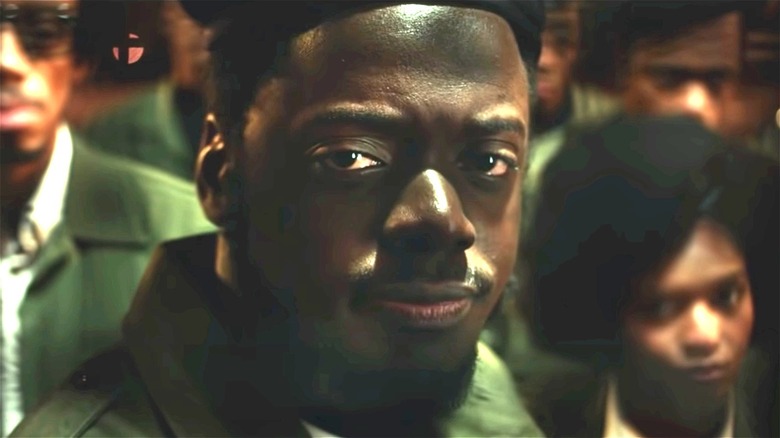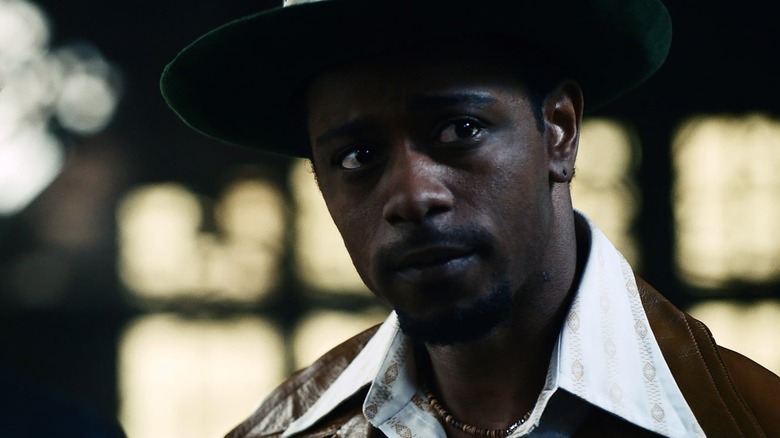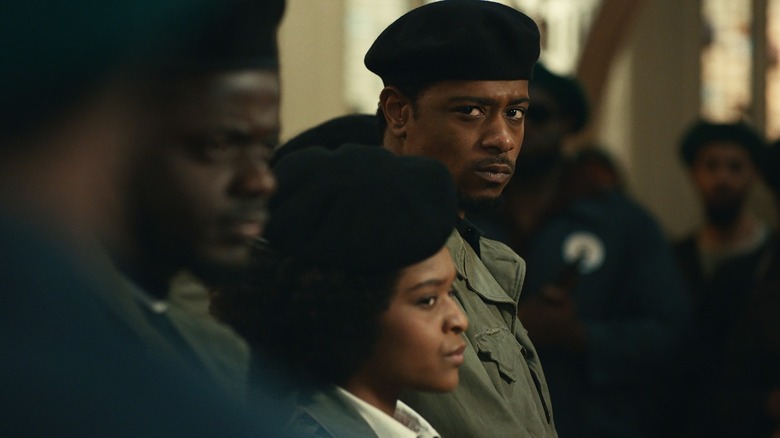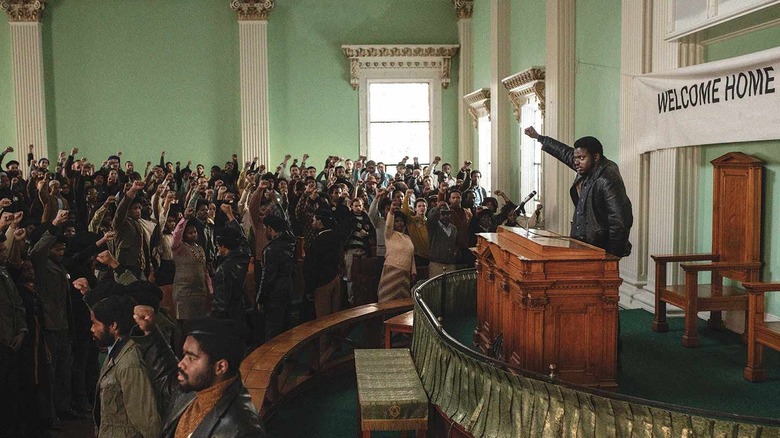How Accurate Is Judas And The Black Messiah?
Crafting a biographical film can be a tricky prospect for a filmmaker. While the best ones arguably try and stay true to the figure or figures they're representing, there are times when dramatic license is needed to increase tension or create a more cohesive story. "Judas and the Black Messiah," one of the latest high-profile biopics, is certainly no exception to this rule.
Focusing on Fred Hampton (Daniel Kaluuya), who was the chairman of the Black Panthers in Illinois, and William O'Neal (Lakeith Stanfield), the FBI informant who betrayed Hampton, "Judas and the Black Messiah" released in early 2021 to extremely positive reviews. The film eventually went on to be nominated for five Oscars, with Kaluuya taking home the Best Supporting Actor trophy for his incredibly moving performance as Hampton. "Judas and the Black Messiah" even had the added benefit of being approved of by Hampton's family, and Fred Hampton Jr. even served as one of the consultants for the film.
But just how accurate is "Judas and the Black Messiah?" Where do the real events end and where does the dramatization begin? The answer ties more into how O'Neal is portrayed than anything else.
Judas' moral conflict
While there are more than a few smaller examples of how much "Judas and the Black Messiah" dramatizes or exaggerates real-life events, one of the more central conflicts of the film may be the biggest of all: William O'Neal's portrayal. Several of the events that O'Neal is shown to be a part of or instigate actually are based on documented fact (via Smithsonian Magazine), but "Judas and the Black Messiah" may have toned down or omitted some schemes entirely. O'Neal was known for trying to push the Black Panthers into a more violent and radical direction, even going so far as to suggest that the group set up traps around their headquarters.
Another area where the film makes assumptions rather than relying purely on fact is just how much O'Neal wrestles with his own conscience. At the end of the film, a title card suggests that O'Neal died by suicide on the same night that a special aired detailing his betrayal of Hampton. Such a special did air, titled "Eyes on the Prize 2," and O'Neal did do an interview for it, but his segment didn't actually air until over a month after he had died. O'Neal's death was ruled a suicide, but his reasons for doing so have never been known with any sort of certainty. Still, "Judas and the Black Messiah" dramatizes it for the sake of storytelling.
If you or anyone you know is having suicidal thoughts, please call the National Suicide Prevention Lifeline at 1-800-273-TALK (8255).
Hampton's community efforts
The rest of the events that take place in "Judas and the Black Messiah" are actually fairly factual (via Politifact), though again, there are small dramatizations or name changes. Hampton really did create programs to serve the Black community. These included free health clinics, breakfasts, and education programs to help his community gain self-sufficiency. They were popular in the neighborhoods where Hampton held them and represented a big part of his efforts to bring about positive change in Chicago.
While "Judas and the Black Messiah" doesn't make it a central point of the film, Hampton also really did form a Rainbow Coalition. This group included members from various local leftist organizations, and its membership was comprised of whites, Blacks, and Puerto Ricans. Hampton even brokered peace between the various gangs of Chicago, convincing them that their real enemy was the government and the police. Obviously, it was a peace that didn't last once Hampton was killed, but it was an impressive accomplishment that the film touches on.
Hampton's assassination
This part of the film is where things get a little murky. While it is believed that Fred Hampton was drugged the night before he was killed by the FBI and local police, it's unclear if O'Neal was the one to carry it out. Per Smithsonian, what is clear is that O'Neal actually did provide the FBI with a blueprint of the apartment where Hampton was shot, though the circumstances of that are again uncertain. The words that the officers said before shooting the unconscious Hampton are taken directly from statements made (via Democracy Now) by Deborah Johnson (Dominique Fishback).
Basically, "Judas and the Black Messiah" draws heavily from actual history and sticks to the facts quite well. Sure, there are dramatized moments and assumptions made about O'Neal's motivations and mental state, but that's to be expected from a Hollywood biopic. Overall, the movie could have been a lot more dishonest about its subject matter or skipped over some of the more controversial topics entirely. Instead, director Shaka King decided to craft a film that honors Hampton and the fascinatingly short life he led, and the legacy he left behind.



